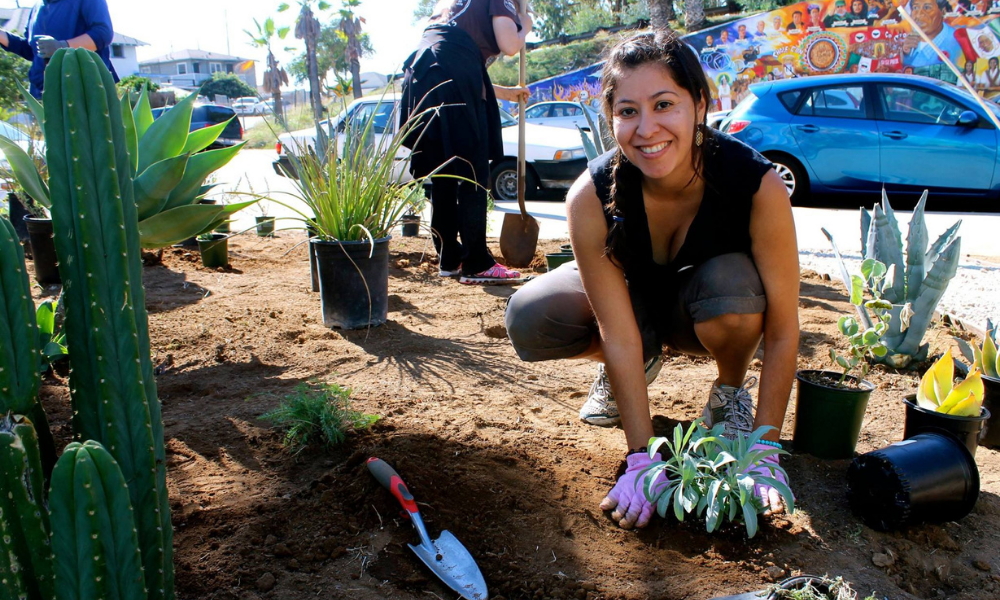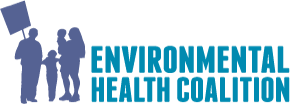
Rooted in Comunidad, Cultivating Equity (RICCE) is a community-driven program to fund climate change resilient projects that will preserve, protect, and strengthen San Diego’s Historic Barrios – Barrio Logan, Logan Heights, Sherman Heights, Stockton, Shelltown, Southcrest, Mount Hope, Grant Hill.
Considered cultural gems, these majority minority neighborhoods have suffered generations of racist decision-making that has led to decades of toxic pollution and life-long diseases like asthma. Barrio Logan’s rate of asthma‐related hospital visits is higher than 95% of census tracts throughout the state.
Read More
Throughout the planning process, lead grantees the Environmental Health Coalition and San Diego Foundation, along with 10 partners, have worked to ensure RICCE is grounded in and led by the community. RICCE was developed with the input of 400+ community members who provided feedback through two community workshops and an in-depth survey.
RICCE includes community-driven projects and three transformative plans. Each project will contribute to a community that is cleaner, healthier, and better prepared for climate change disasters. It will help build parks, community resources, healthier homes with renewable energy, and improve access to clean transportation. These projects are wholly or partially funded by $22 million from the State Transformative Climate Communities (TCC) grant – learn more about the grant below.

How to Get Involved
Transformative Plans
Transformative plans ensure TCC grant investments – in this case the RICCE program – provide direct benefits to neighborhood residents. Plans include measures to help keep long-time residents and businesses in the neighborhood so that they can benefit from the state’s investments in the long run.
Community Engagement Plan
The purpose of the community engagement plan is to make sure RICCE projects meet the community’s needs and reflect their values.
Read more
To do this, EHC will conduct door-to-door canvassing and partner with community stakeholders to collect feedback from residents, share resources, and recruit a diverse membership for the Community Advisory Board (CAB). As part of the plan, EHC will have public workshops to keep the community informed on project development and gather any feedback, concerns, or complaints, which will then be addressed by the CAB.
The CAB – made up of residents and people who work or serve in the area – meets quarterly to evaluate project progress and provide recommendations as needed. The CAB’s recommendations are reviewed and ultimately decided on by the Collaborative Stakeholder Structure, which is comprised of 11 project leads and 12 stakeholders – including 6 CAB members. These 6 CAB members are elected by the board and serve a 1-year term.
Displacement Avoidance Plan
The Plan brings together grassroots and non-profit organizations focused on fighting gentrification to provide resources to residents and small businesses in the project area. These resources include:
Read more
- Tenant “Know Your Rights” workshops led by Alliance for Californians for Community Empowerment (ACCE) and Housing Justice Collaborative (HJC);
- No Vendas! (Don’t sell to Developers!) workshops led by Tierras Indigenas Community Land Trust (TICLT) and ACCE;
- Community Land Trust education and recruitment led by TICLT;
- Consulting and legal assistance for Tenants in Common conversions led by ACCE and TICLT;
- Worker Co-op trainings led by Cafe X,
- Micro-enterprise trainings for local businesses led by Logan Heights Community Development Corporation (LHCDC).
- ACCE and HJC will also convene a group of residents and small business owners over two years, to develop a set of policies that address their specific needs around housing and displacement.
Workforce Development and Economic Opportunities Plan
The goal of the Workforce Development and Economic Opportunities Plan is to remove barriers and improve access to high-quality jobs that benefit not only the individuals and their families but also the entire community.
Read more
Drawing on over 35 years of experience in workforce development, Urban Corps of San Diego County is leading the initiative in creating better economic opportunities for the members of the community. A new Workforce Resource Center located within the Logan Heights Community Development Corporation (LHCDC), with a full-time Resource Center Coordinator, will support one-on-one appointments with community members, connecting clients to economic opportunity and workforce readiness resources.
The Workforce Center will establish a new countywide database that is continually updated with information on training and job opportunities. Urban Corps will provide transit passes and wraparound services to two existing programs: Multi Craft Core Curriculum (NABTU, Construction Pre-Apprenticeship) for careers in construction and GROWER Farming Workforce training. They will also provide stipends for community members to participate in training that is either credentialed or in the process of becoming credentialed.
Other supportive services including translation/interpretation and childcare. Career navigators from partner organizations will come to the Resource Center and provide programming and access to training/job resources. This Workforce Center will facilitate recruitment activities through partnerships with large employers. Trainees will be prepared for jobs in the fields of renewable energy/energy efficiency, green building, sustainable agriculture/food systems, xeriscaping, environmental policy and community education.
Thank you community partners
Dedicated community partner organizations worked closely with EHC and SDF to envision RICCE, make it a reality, and ensure it meets the needs of the Historic Barrios. These amazing partners are the City of San Diego, Chicano Park Museum and Cultural Center, Gray Area, GRID Alternatives San Diego, Project New Village, San Diego Metropolitan Transit System (MTS), Tierras Indigenas Community Land Trust, and Urban Corps of San Diego County.
Get to know the projects
Coming soon
Question & Answer
What is TCC?
The California Strategic Growth Council’s (SGC) Transformative Climate Communities Program (TCC), administered in partnership with the California Department of Conservation, funds community-led development and infrastructure projects that achieve major environmental, health, and economic benefits in California’s most disadvantaged communities. For more information, visit https://sgc.ca.gov/grant-programs/tcc/.
What is the history of the RICCE program?
In 2019, EHC was awarded a Transformative Climate Communities (TCC) Planning Grant from the California Strategic Growth Council to do outreach to identify community priorities for climate resiliency projects and develop partnerships.
EHC built a Collaborative Stakeholder Structure (CSS) of residents and businesses, along with local government agencies and Community Based Organizations (CBOs) and convened them regularly over several years to develop the climate- resilient and pollution- reduction projects included in the TCC implementation grant application.
In 2022, EHC partnered with the San Diego Foundation – our region’s community foundation – to lead the TCC implementation grant application process.
The RICCE program applied for $29.5M in TCC funds in summer 2023 and was awarded $22.125M in December 2023.
The State chose to make four TCC awards instead of the originally planned three awards, which left a $7 million funding gap for our TCC project. To fill this gap the State alerted SDF to a new federal funding opportunity from the EPA Community Change Grant program to complement and supplement TCC efforts in the same project area.
In spring 2024, EHC and SDF worked with the TCC partners, who had projects that met the EPA criteria, to apply for additional Community Change Grant funding, which resulted in a $20M award in November 2024.
On May 1, the EPA terminated SDF’s Community Change grant award, citing that it does not align with the funding priorities of the current administration.
How were the RICCE projects developed?
EHC led extensive community outreach to project area residents, businesses and community volunteers beginning in 2019 and continuing through 2023 to gather input on community priorities for projects to include in the TCC application, including:
- Creating a Community Advisory Board for the project, consisting of 16 project area residents who met 14 times during the application process to develop the community values for the RICCE program and provide input on the budget and project selection
- 24 community-based organizations and community groups – including churches, parent groups, and recreation centers – shared information about the project with their network
- 3 public workshops with a total of 121 participants
- 488 survey responses from area residents on priority projects
- 1,956 flyers distributed to homes, businesses, and public spaces in the project area
- Website and social media with over 20,000 Facebook and Instagram impressions
- Phone banking to reach 807 residents
- E-blasts opened by 1,060 recipients
- Press conference with the Mayor of San Diego, city council members, and stakeholders

